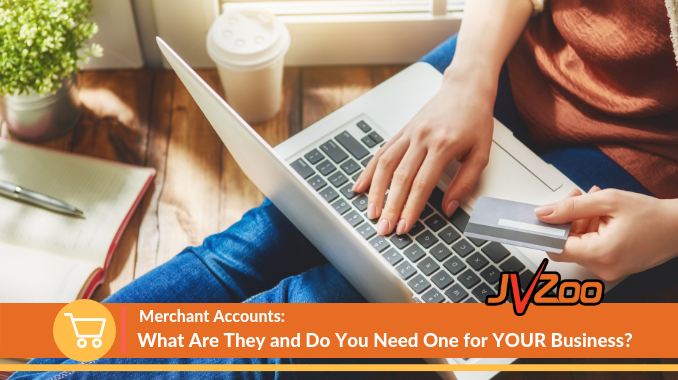Merchant accounts. What are they?
A merchant account simplifies the complex interactions that happen between you, your customers, the credit card companies, and the payment processors that communicate every time you accept a credit card payment.
Selling online is all about making it simple and easy for the customer to make the purchase. If you want to do business at all, of course you must be able to accept credit card payments. And in order to do so, you need to have a few things in place.
There are three different elements involved in online transactions:
- Payment Gateway – Allows you to securely charge your customer’s credit/debit card with the purchase he/she makes online.
- Payment Processor – These are the financial institutions that work in the background to provide all the payment processing services used by an online merchant. The payment processor connects to both the merchant account and payment gateway, quickly passing information back and forth, keeping it secure and almost instantaneous for the end user.
- Merchant Accounts – Sometimes referred to as Merchant IDs, these are the types of bank accounts that authorize merchants to accept credit or debit card payments online. These accounts are required if you want to use a payment gateway to process transactions from your website. In all cases, to get a merchant account, you must have some sort of arrangement with a payment processor to charge a customer’s credit/debit card.
Let’s take a look at how these three elements work together:

Joe goes to a website to purchase a product. He enters his credit card info and hits the buy button. In a few moments, all of the following happen:
- Joe’s personal and CC info go to the payment gateway.
- The transaction details are securely passed from the gateway to the payment processor.
- The merchant ID is referenced and the transaction info goes to the merchant account.
- The bank who issued the CC is also contacted to be sure Joe has the money or credit to make the purchase.
- If the bank approves (or denies) the payment, the info is sent back through the payment processor and then back to the payment gateway to allow the transaction to move forward.
- Joe sees a “transaction approved” (or denied) notice appear on his screen.
- Once approved, Joe’s bank releases funds to the merchant account
- After a period of time, the merchant account funds are available to automatically be moved to the seller’s business account. Interchange fees that go the credit card association and processing fees may apply.
So, why do you have to have a separate merchant account that you can’t actually use?
A merchant account is simply a holding place for the money the customer spends to buy your product. Since some transactions don’t go through, and multiple transactions may go through in one day, the funds are held in the merchant account for a couple of days to cover refunds and also to batch the transactions to reconcile more easily as one deposit to your business account.
Why should a business have a merchant account?
Having a merchant account ensures that you get paid properly, that banks don’t take a loss, and that the customer is protected from scams. Merchant accounts help with fraud prevention because a chain of events occurs to check and double check that the customer’s credit card is valid. Everyone is held accountable by the rules of the credit card agreement.
A merchant account is an option to look at if PayPal has banned or restricted your account…or if you are worried that it could happen. The big players in the industry use the merchant account method to avoid getting shut down by entities like PayPal. It’s an alternative.
What makes a merchant account hard to get?
There are a lot of options out there, so do your research. The most difficult first step to establishing a merchant account is the potential for dealing with a poorly educated sales team for a provider. If the sales team are not properly trained on the ins and outs of processing rates, contract terms, and overall details about the merchant account AND they are paid solely on commission, they could set you up for disaster.
 Do your research on rates and fees, the length of the contract you are committing to, and any type of early termination fees. Read through the entire contract before being pressured into signing it. Don’t make hasty decisions, because missing items in the fine print could cost you big time later if you don’t look closely or allow a pushy sales agent to convince you that you are under a time crunch to make your decision.
Do your research on rates and fees, the length of the contract you are committing to, and any type of early termination fees. Read through the entire contract before being pressured into signing it. Don’t make hasty decisions, because missing items in the fine print could cost you big time later if you don’t look closely or allow a pushy sales agent to convince you that you are under a time crunch to make your decision.
Another difficulty you will run into is the amount of money that can be processed through your merchant account each month. If you go over your limit, your account could be frozen or you could be charged crazy high fees. Negotiate the terms and fees if you can. A marketer who has a history of huge launches will need to prove it with numbers and facts so that they can negotiate higher account limits.
Another method some marketers use is merchant account rotation. This is a system of 4-5 merchant accounts that are set up to “catch” the revenue in case the primary account goes over it’s limit or gets shut down. That’s another point of negotiation; either setting up multiple accounts with one provider or setting up accounts with more than one provider.
Once you find a quality provider, you’ll need to the following info:
- Business name
- Contact info
- Tax info
- Routing number and account number for your business account to accept deposits
- An estimate of how much volume you plan to handle
- Methods of payment you plan to accept
- Average sales price
- How many big launches you do per year (is your business seasonal)
You may have to have a credit check so that the provider can look into your history of handling money and fraud prevention.
Why is the IM industry considered high risk (or maybe considered high-risk depending on what the seller is selling)?
The fact that all transactions are completed online in a “card not present” situation, with the customer entering their credit card numbers in rather than swiping a physical card makes the internet marketing industry super high risk. Fraudulent credit card numbers are easy to come by for clever scammers. So, it’s likely you’ll need to jump through some hoops to get your merchant accounts set up.
Merchant accounts can seem pretty daunting at first, but they don’t have to be. It’s an option…and having options to protect your business are always worth considering.


1 Response to "Merchant Accounts: What Are They and Do You Need One for Your Business?"
can u help about this site. . .i just need some extra income. . .